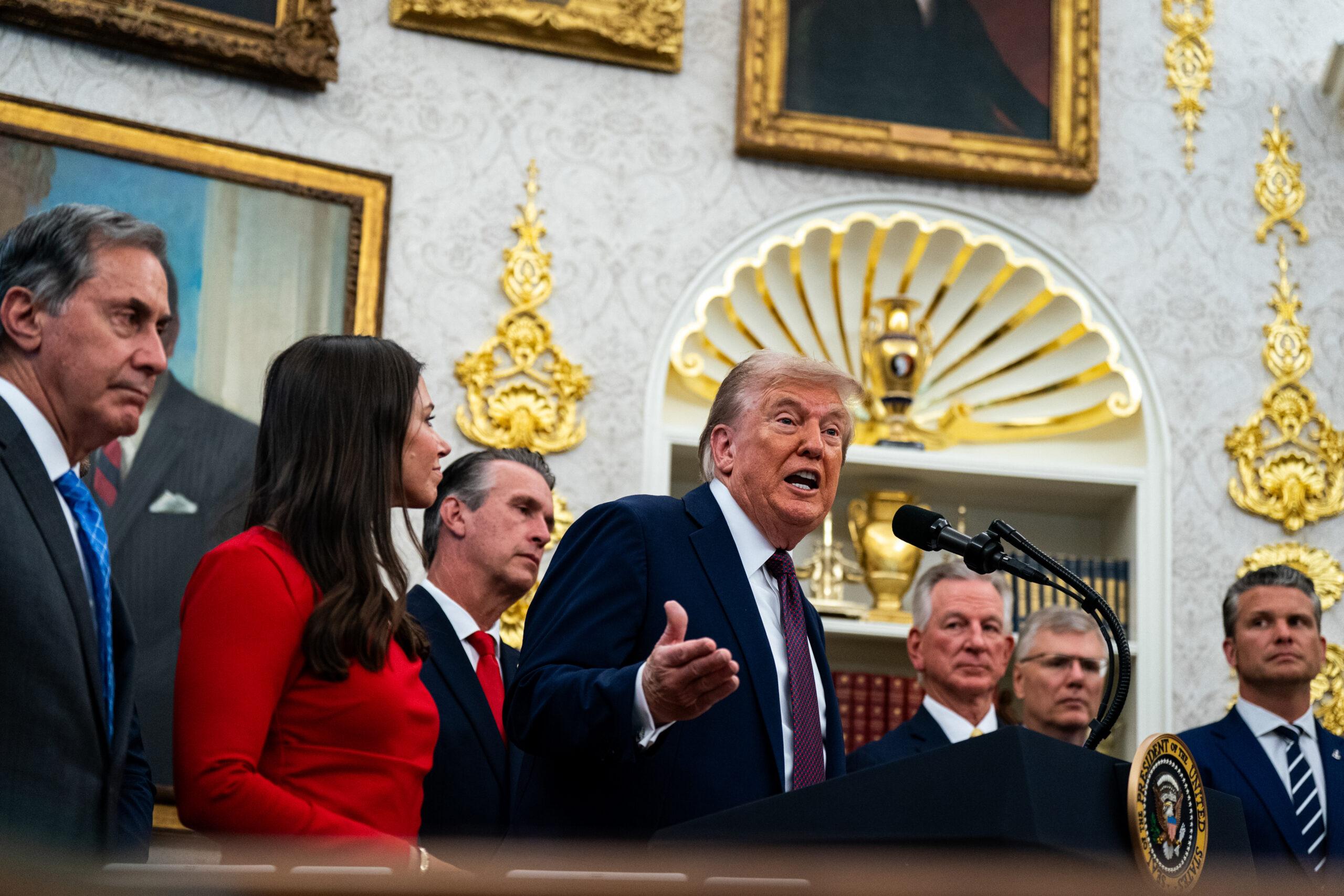
Plain English With Derek Thompson
What Is Trumponomics? Part 1: How Donald Trump Is Breaking American Capitalism
Hosts
About the episode
Today is the first of two interviews this week trying to answer this question: What is Trumponomics?
From the 1980s to the 2010s, it was generally assumed that Republicans and Democrats had settled differences in economic policy. Republicans wanted lower taxes and less spending on welfare. Democrats wanted higher taxes and more social spending.
Reality didn’t always conform to those differences. George H.W. Bush famously raised some taxes, and Bill Clinton famously reduced some welfare spending. But generally speaking, the socialists voted for Democrats, and the corporate libertarians and free-market folks found their home in the GOP.
What’s interesting about Trump’s theory of power and economics is that he doesn’t just scramble this divide. He obliterates it.
Some of Trump’s measures are so classically Republican, you could imagine the ghost of Ronald Reagan signing off on them. After all, his signature legislative accomplishments in both terms are two huge corporate income tax cuts. But when Trump announced that the government was taking a stake in Intel, Bernie Sanders cheered the news and Gavin Newsom called him a socialist.
Trump has single-handedly instituted the biggest tariffs in 100 years—tariffs that are so unusual and extralegal that a federal court just ruled that most of them are, in fact, against the law. He’s waging war on the Federal Reserve, grabbing at an institution that has historically enjoyed independence when it comes to setting interest rates and managing monetary policy.
Trumponomics is capitalist and socialist, it’s obsessed with defeating China and also obsessive about copying China, and it’s sometimes focused on keeping America from getting ripped off and sometimes focused on issues so personal they have nothing to do with the national interest at all.
Today’s guest is Greg Ip, the chief economics commentator at The Wall Street Journal. According to Greg, the best way to see clearly what Trump is up to is to see his economic policy as what he calls “state capitalism.”
If you have questions, observations, or ideas for future episodes, email us at PlainEnglish@Spotify.com.
In the following excerpt, Derek and Greg Ip dive into Donald Trump’s economic policy and explore whether there is any precedent for this unique blend of socialism and capitalism in the U.S.
Derek Thompson: Greg, for decades, Republicans have been the party of the private sector and the party of private markets. They’ve been the chief deregulators and the tax cutters. And what’s notable about Trump is that he has cut taxes, he has cut regulations, but he’s gone so far beyond that. He has created the largest tariff regime in a century. He’s demanded a 10 percent stake of Intel, which got a lot of people talking about American socialism. He intervenes in the day-to-day affairs of private companies to a very unusual degree. This isn’t full-blown socialism. It clearly isn’t full-blown capitalism. What is it?
Greg Ip: Those are all exactly right, Derek. And in fact, in some ways, Trump is behaving like a traditional Reagan conservative, which as you say, he’s for cutting taxes, he’s for cutting regulation, especially on industries that he likes, like oil and gas. But as you say, he’s also exercising this very muscular interventionist approach to private industry in ways that we have not traditionally seen any president, much less a Republican president, do before.
And I guess the best label I could come up with for this was state capitalism. And state capitalism, it’s not socialism because the government doesn’t literally own the means of production. And it’s not pure capitalism because the private sector is not being left to its own devices to allocate capital to where it thinks the best return is. Rather, it’s a bit of a hybrid between the two, where the government sees fit to basically direct the private sector where to direct its resources, how to invest, how to conduct business.
And it doesn’t do this with every business. It’s not telling every corner grocer or dry cleaner how to conduct business. But what you often see in countries is that there’s this ever-present temptation to seize the commanding heights of the economy, which often means the most high-profile industries, which can often mean utilities or high-tech manufacturing, and tell them what to do. And that’s kind of what we’re seeing Trump do, especially with these very high-profile moves on things like steel.
When Nippon Steel wanted to buy U.S. Steel, Biden said no. Trump said, “Yes, but you have to give us a so-called golden share,” which is effectively a veto over some of its most important decisions. Same with Intel. The Biden administration said, “We’ll give Intel and other chip makers these grants in return for them making these semiconductor plants.” Trump said, “Hey, I got an idea. Instead of just giving you the money, why don’t you give us 10 percent of the company?” So he’s not doing that with every company, and I don’t think he’ll do it with every company, but you are hearing them talking about doing it with companies over which the federal government has considerable leverage. That is very much a state capitalist mindset.
Thompson: Trump is unusual, but state intervention capitalism is not so unusual. In 2007, for example, the U.S. government in the Great Recession bails out the banks and the car companies. Under Joe Biden, you had all this talk about industrial policy, which, to a certain extent, is the state intervening in private capital. You had the Inflation Reduction Act, tons of money for green energy projects. You have the CHIPS and Science Act, tons of money for chips. Was that state capitalism as well, or is what Trump is doing different?
Ip: I think that at the moment I am more inclined to call it evolutionary than revolutionary, with the important proviso that this movie isn’t over yet. And there are reasons to see him going in directions we haven’t seen him go before. But you’re absolutely right; it is not necessarily a novel thing for the United States to take positions in private companies or to tell private companies what to do.
During the Second World War, the War Production Board, I think it was called, effectively took over large swaths of manufacturing and said, “Hey, you, Ford, you have to build Liberator bombers,” and so on. “Hey, Kaiser, you need to go build ships for us in California.” And we understood why, because we were fighting a war, and those kinds of exigencies required the government to get involved in the private sector in a way they hadn’t before.
And then there have always been these emergency situations that you just discussed, like in the global financial crisis. If those major banks, if General Motors had been allowed to fail, there was a recognition that this would have enormous costs for the economy, well beyond just the cost of the shareholders and the employees. And so [Troubled Asset Relief Program] money was deployed for the government to take positions into those companies so that they would not go bust and could restructure themselves so that they could be viable enterprises going forward.
Importantly, though, in both those situations—the war, the global financial crisis—as soon as the crisis was over, the government got out. So before long after TARP, the banks were saying, “Take the money back. We don’t want you telling us what to do with our executive compensation and our dividend policy.” General Motors and Chrysler had reshaped themselves. They’d slimmed down. The government sold their shares; the government did not want to be in that.
So is what Trump is doing now—how different is that? Well, first of all, as I said, telling companies what to do is not that revolutionary. And as you say, the CHIPS Act, under Biden, sort of took us down this direction. Here’s the things about Trump that might be on the revolutionary side. First of all, we’re not in a war, and we’re not in a crisis.
In some sense, his interventions are not, by design, necessarily temporary. There’s no end date to when he will let U.S. Steel go on and do its own thing, or Intel, for that matter. He seems to want leverage and control for its own sake, almost irrespective of where we are. I think that’s a little bit different. We don’t know how far it goes. His folks have talked about, for example, creating a sovereign wealth fund, and they will take investments in other companies like Intel to put in this. That would be revolutionary.
And then the final thing that I think is also very different is that there’s no statutory basis for any of what Trump is doing. So when money was put into the banks and the car companies, there was this law, the Troubled Asset Relief Program. And you could argue that the Obama and Bush administrations may have pushed the intent of that law by buying equity when the original plan was to buy mortgages, but there was still a law. There’s no statutory basis, really, for much of what Trump is doing. And that means it’s very hard to tell what his intentions are, and there really aren’t any limits to what he plans to do.
This excerpt has been edited and condensed.
Host: Derek Thompson
Guest: Greg Ip
Producer: Devon Baroldi
